- Details
- Written by Gordon Prentice
The result of yesterday’s Provincial election in Newmarket-Aurora was never in any doubt. 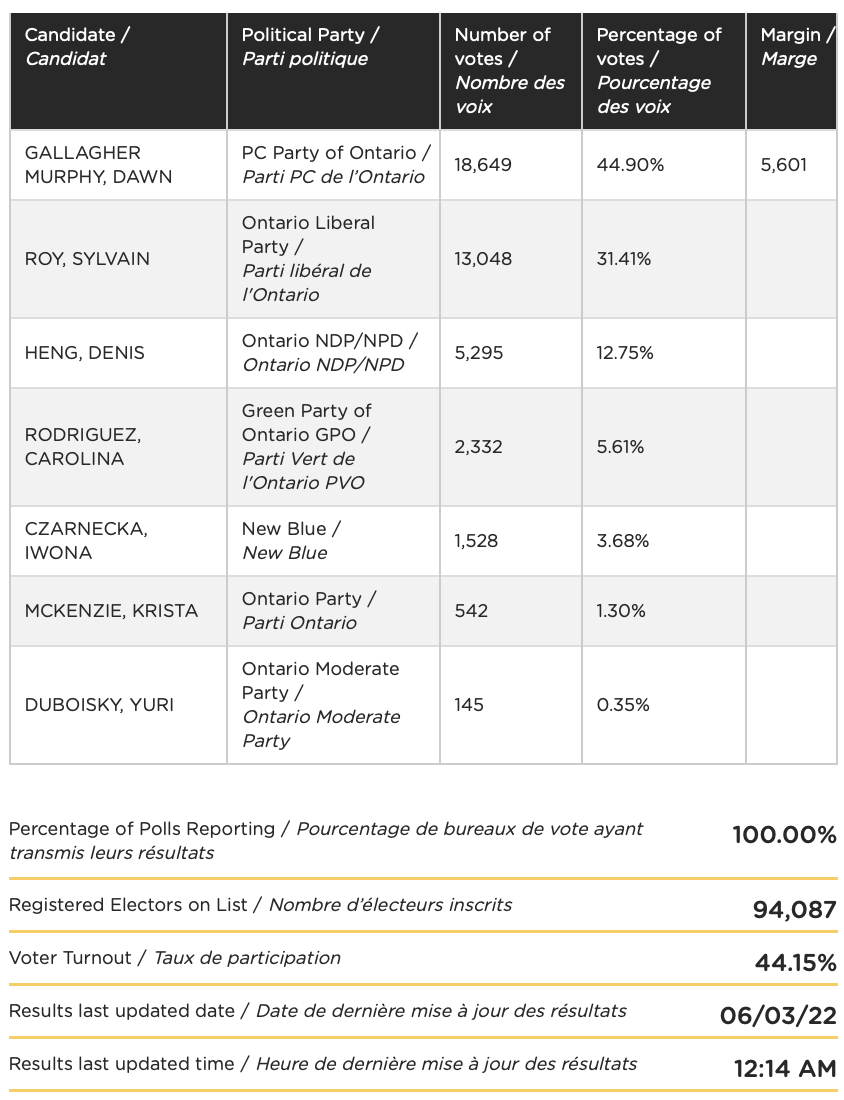
The PC candidate romped home with 45% of the votes cast despite a lacklustre campaign in which she boycotted candidates’ debates and declined to give interviews to the media.
Turnout is lowest ever
The second big story of the election is the collapse in voter turnout. 57% of voters in Ontario couldn’t be bothered to vote – the lowest turnout ever.
Only 44.1% of the Newmarket-Aurora electorate voted compared with 58.9% in 2018.
The low turnout skews the results. Those determined to vote tend, on the whole, to be Conservative leaning voters.
Liberals stretch lead over NDP
Comparisons with the last Provincial Election must come with caveats. The Liberals then were uniquely unpopular.
In 2018 we saw the NDP move into second place though only 565 votes ahead of the Liberals. Yesterday, the Liberal Sylvain Roy was 7,753 votes ahead of the NDP candidate Denis Heng. Both were impressive candidates but the so-called progressive vote coalesced around the Liberals.
The Greens did well this time with 5.6% of the vote (3.5% in 2018).
Ford’s PCs refused to engage in debate and it was left to the other parties to fill the void – and here in Newmarket-Aurora they did so by agreeing with each other on many of the big issues. At the Newmarket Chamber of Commerce debate, all the candidates were against the Bradford Bypass so the sparks didn't fly. Gallagher Murphy, in favour, wasn’t there to defend her position.
Resignations inevitable
It was inevitable that Andrea Horwath and Steven Del Duca should announce their resignations as Leaders of their parties last night. The prospect of Horwath staying on for a fifth election campaign in 2026 as NDP leader was never on the cards. Too many voters just tuned her out. They had heard her anecdotes from the campaign trail a million times before and they had become jarringly familiar.
Del Duca had some good policies but he never set the heather on fire.
His policy to ban handguns within a year of taking office and his “buck-a-ride” promise could have grabbed the voters’ attention but didn’t. Ford’s licence plate rebate got a lot more coverage, for and against.
Making the political weather
Del Duca had to make the political weather and get noticed. But it never happened.
We shall see how Ford plays the hand the voters dealt him. Defensively, I hope. Both for his sake and ours. With such a solid majority he could do a lot of damage.
I shall be fascinated to see how my new MPP, Dawn Gallagher Murphy, settles into her new role.
Will she keep constituents waiting months for an appointment? Will she speak out on the big issues of the day? Or will she follow Ford’s talking points, never daring to step out of line with the man who appointed her as PC candidate?
To have travelled so light so far is a remarkable achievement.
Saying nothing about anything is clearly a winning strategy.
This email address is being protected from spambots. You need JavaScript enabled to view it.
Update at 4pm on 3 June 2022: From Newmarket Today: Newmarket-Aurora reacts to Conservative win.
Update on 4 June 2022: From Newmarket Today: "Gallagher Murphy rides blue wave to victory in Newmarket-Aurora" From the Toronto Star editorial: "Parties share a lot of the blame for record low turnout" And from the Globe and Mail: "Record low turnout is not a good sign for our democracy."
Update on 7 June 2022: From the Globe and Mail editorial: Ford won the election by becoming a fiscal yes-man.
Update on 7 June 2022: In a video post on Twitter Dawn Gallagher Murphy thanks voters in Newmarket-Aurora for their support
And what happened last time:
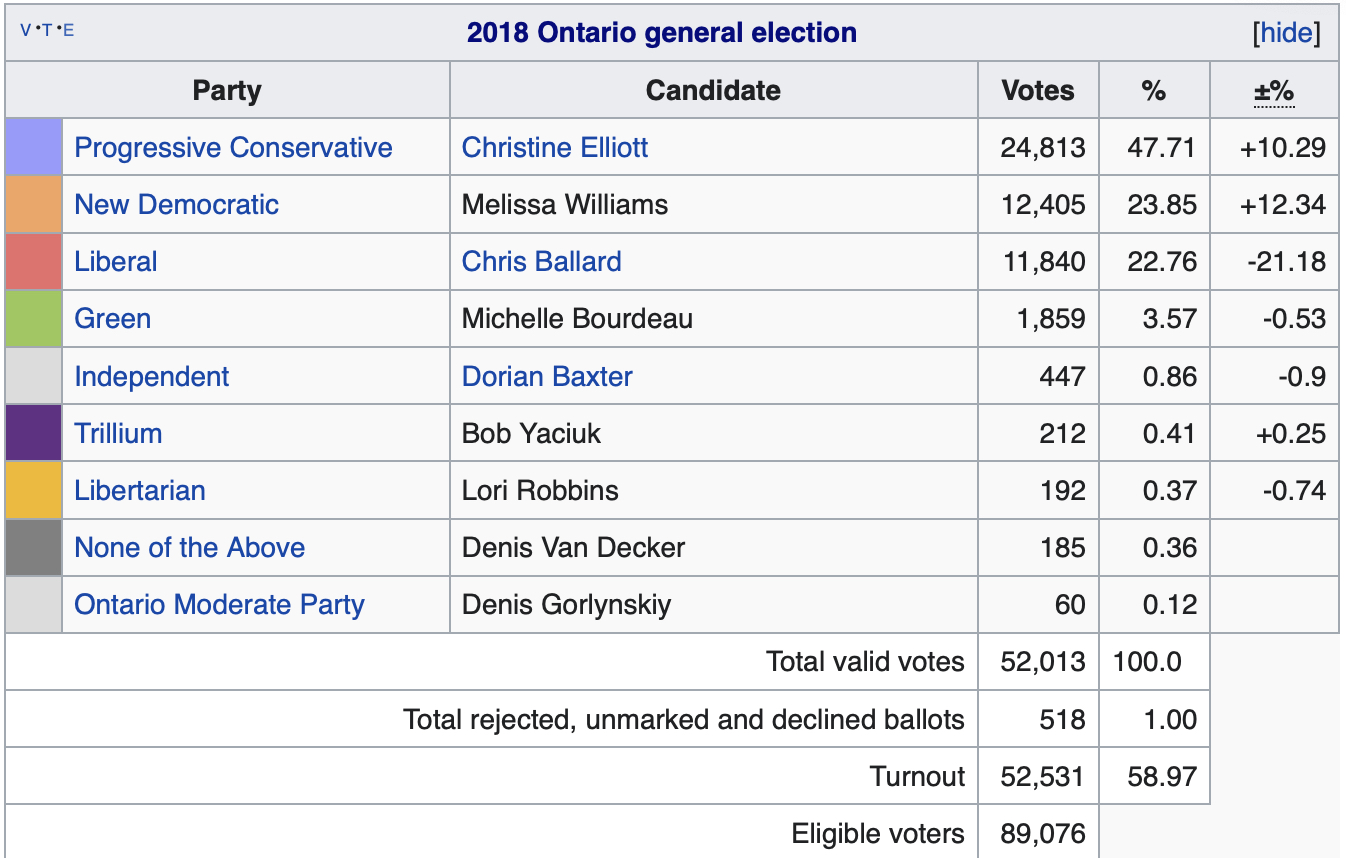
- Details
- Written by Gordon Prentice
Doug Ford's appointee, the Progressive Conservative candidate, Dawn Gallagher Murphy, avoids the media to the very end.
My spies tell me CTV will be doing a profile of Newmarket-Aurora in their programme at 6pm this evening (Wednesday 1 June).
I have no idea how long or short the piece will be.
But our next MPP, the ventriloquist’s dummy, office manager Dawn Gallagher Murphy, declined to be interviewed.
This email address is being protected from spambots. You need JavaScript enabled to view it.
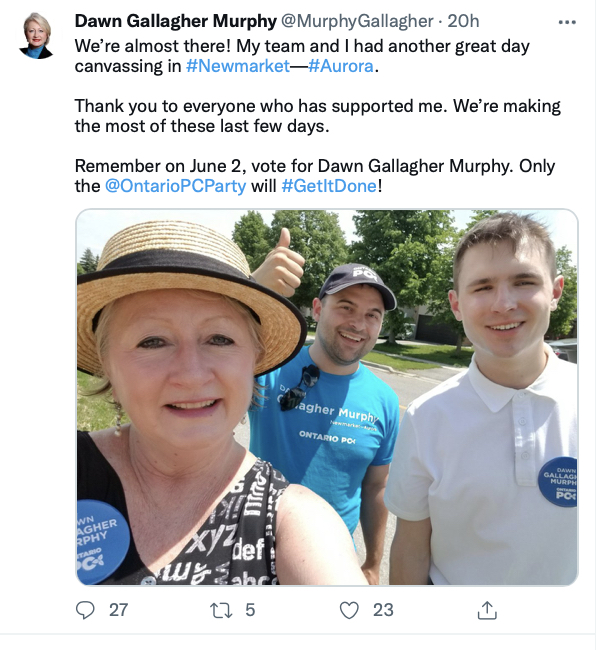
- Details
- Written by Gordon Prentice
Like most Canadians I welcome the Prime Minister’s announcement on Monday of a national freeze on handguns. 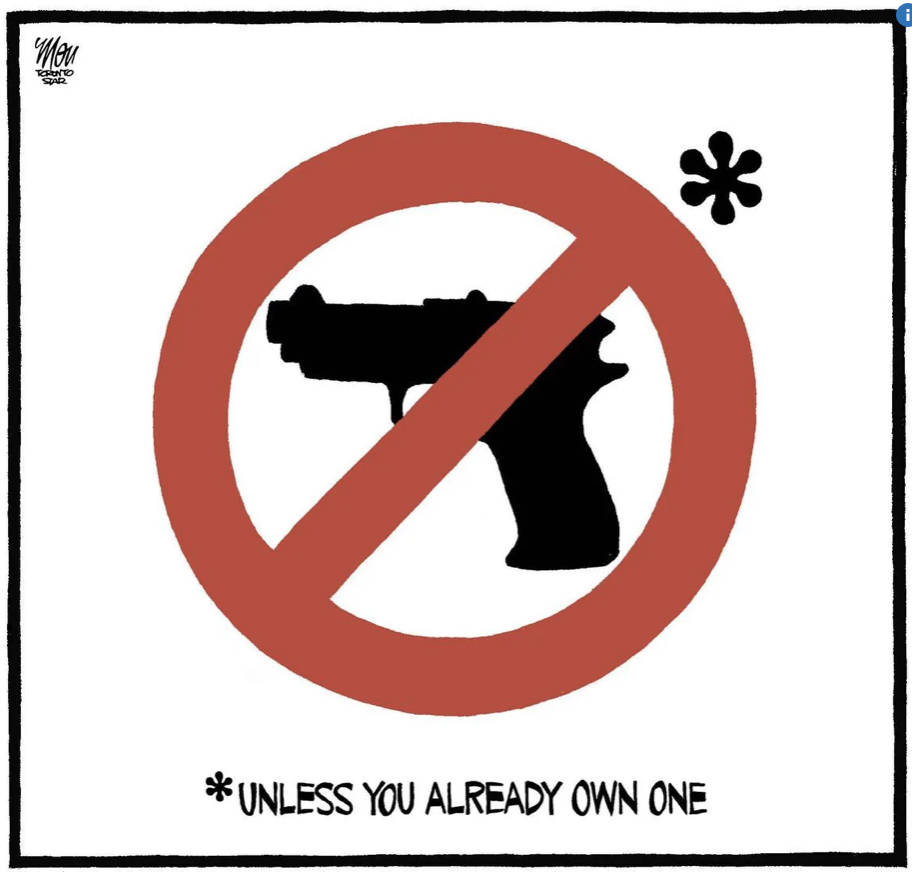
The reintroduced Bill C21 (abandoned last year when Trudeau called an early Federal Election in September) and the accompanying regulations will:
“prevent individuals from bringing newly acquired handguns into Canada and from buying, selling, and transferring handguns within the country”
This is all good stuff. I see the glass as half full, not half empty.
At a stroke, the Ford Government’s veto on a handgun ban in Ontario is removed.
Step in the right direction
People like me who want to see a complete ban on handguns say it is a step in the right direction. But why has it taken this long?
Trudeau’s handgun policy has now morphed through three distinct stages – and it is not over yet. First there was the proposal to give cities and municipalities the powers to ban handguns in their own patches. This was widely panned as being totally unworkable. (Graphic right from the Toronto Star)
Then there was a re-think in Ottawa. The re-engineered policy would give the Provinces and Territories the final say on whether to ban handguns within their own jurisdictions. A billion dollars – as a minimum - was promised by the Federal Government to make the decision to ban easier to swallow.
Clueless
No-one had the faintest idea how the policy would work in practice. In early January I asked my MP, Tony Van Bynen, to explain things after he had flagged the issue up in his December flyer. But he didn’t have a clue. He said he would pass on my concerns on to the new Minister for Public Safety, Marco Mendecino, but, as always, the correspondence disappeared into a big black hole. 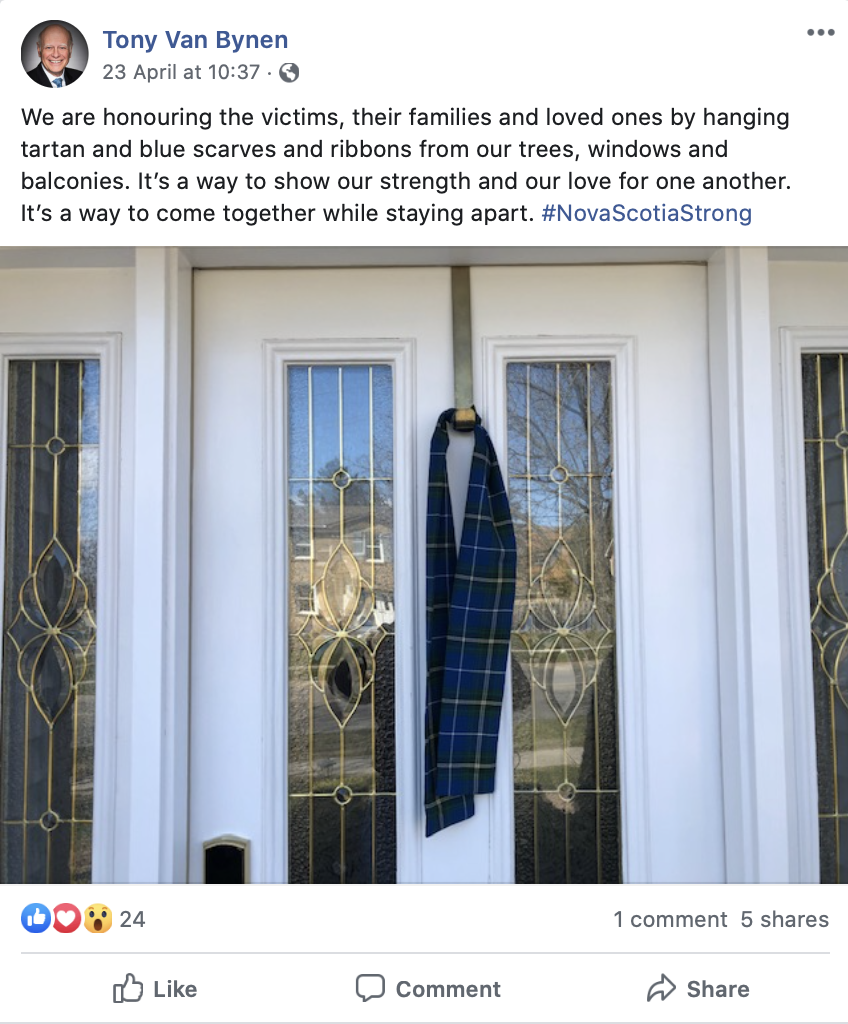
We are now at the tail end of a Provincial election in which Ontario’s Liberal leader Steven Del Duca promised to ban handguns within a year of taking office. The ink on that pledge is hardly dry before it is overtaken by events.
Who is responsible for deciding the Federal Government’s policy on handguns? The Minister, Marco Mendecino? Justin Trudeau? The PMO's Office? Whoever calls the shots it is perfectly obvious Liberal MPs like Van Bynen are not consulted, nor the Liberal caucus. They will get the news like the rest of us, after the event.
Policy making in the Federal Liberal universe is reactive. And often ham-fisted. MPs who put up with this way of doing things end up as decorative parts of the Constitution, spectators not participants.
The courage to speak out
Back in February, a column by the Toronto Star’s Althea Raj caught my eye. She told us she wished more MPs had Joel Lightbound’s courage to speak out.
She says the backbencher who spoke out against his own Government’s Covid-19 response did us all a favour.
“I wish the media and political parties made less of a fuss about internal dissent so that more MPs could find the courage to share their thoughts publicly. It is not normal for a broad-based party to have absolute unity of thought.”
Exactly.
If MPs want to see a nationwide ban on handguns – which is the logical next step after a freeze on sales – then why can’t they say so?
Thoughts and prayers (again)
After the Portapique massacre Tony Van Bynen draped a tartan scarf on his front door and posted the image on Twitter so we could share his anguish. There was love for one another but he stopped short of calling for a ban on handguns. That would be a step too far.
Van Bynen marches in lockstep with the Prime Minister so in his next taxpayer funded newsletter he will be telling us he supports a freeze.
Believe me. This is progress.
This email address is being protected from spambots. You need JavaScript enabled to view it.
- Details
- Written by Gordon Prentice
The respected polling aggregator 338Canada.com puts the Progressive Conservatives as the overwhelming favourites in Thursday’s Provincial election. 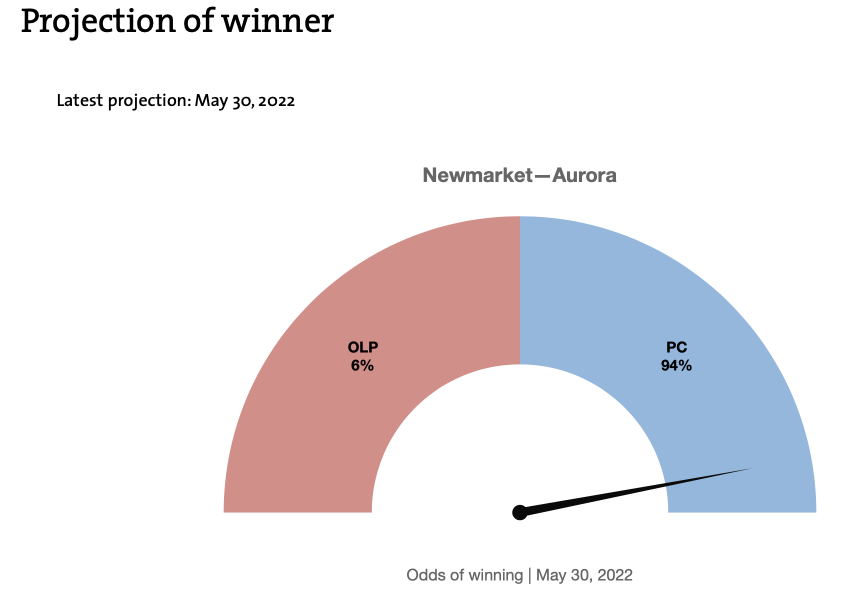
Nevertheless, the voters have the power to confound the pollsters if they so wish. In the last Federal election in Newmarket-Aurora the projections bounced all over the place, first pointing to a Conservative win before settling on the old banker, the safe bet.
There are no polls in the riding. But extrapolations from GTA wide and Provincial polls have a pretty good record in predicting the percentage vote for each Party. Forecasting the number of seats going to each Party is more problematic. No pollster predicted that the 2018 Provincial election would leave the Liberals with a rump of seven seats in the Legislature.
Back "progressive parties"
The Toronto Star’s editorial on 27 May 2022 urges readers to back progressive parties to avoid a second Ford majority.
The Editorial Board advises:
"The best option is to get behind the Liberals in ridings where they are the main alternative to the PCs. In ridings where the election is a two-way contest between the PCs and the New Democrats, support the NDP."
Easier said than done. 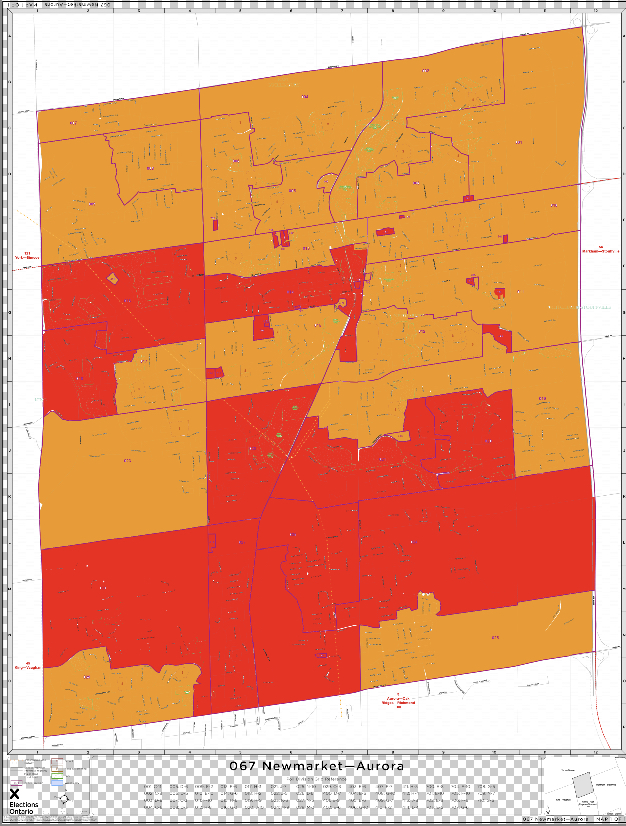
So who should voters back in Newmarket-Aurora to keep the silent and elusive office manager out?
The map on the right shows the NDP and Liberal votes in the 2018 Provincial election in Newmarket Aurora after the winning PC vote has been stripped out. The orange areas show those parts of the riding where the NDP polled better than the Liberals. And the red areas show where the Liberal vote was higher than the NDP. In that election the Newmarket-Aurora NDP came second to the PCs who won convincingly.
The Federal election last September gave the Liberals a clear edge but that was with a candidate with huge name recognition and a bland, inoffensive manner.
Getting it done!
Like Dawn Gallagher Murphy, our Liberal MP Tony Van Bynen is, by nature, taciturn and wary of expressing an opinion until it has been fully road tested and certified safe to use.
They both want to get it done. That's the slogan that ticks all the boxes.
On 22 March 2022 he explained what the the pact between the Federal Liberals and the Federal NDP would mean to his constituents and to Canadians more generally:
"The Liberal Party has reached an agreement with the NDP to deliver results for Canadians now. This is about getting big things done for Canadians..."
So they are all going to get it done.
That's nice.
This email address is being protected from spambots. You need JavaScript enabled to view it.
Ford and the photoshopped Gallagher Murphy getting it done
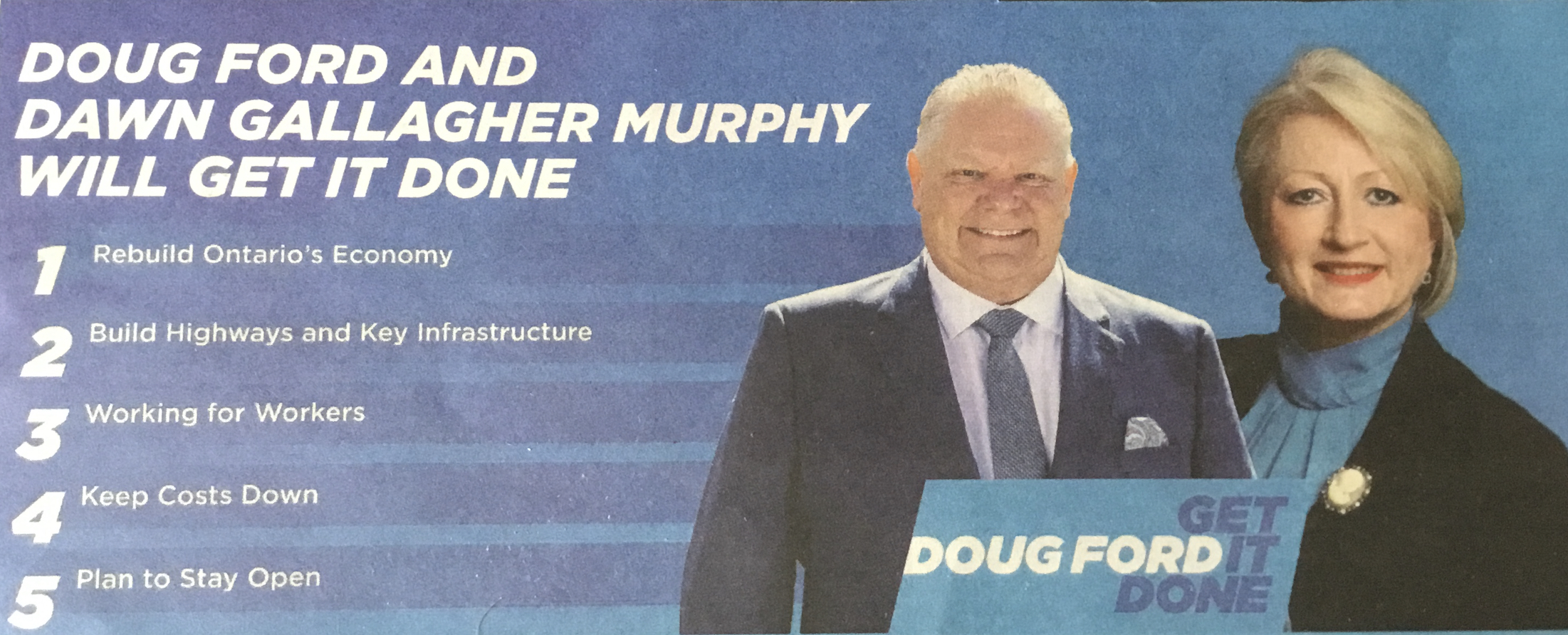
And the vote projection on 30 May 2022:
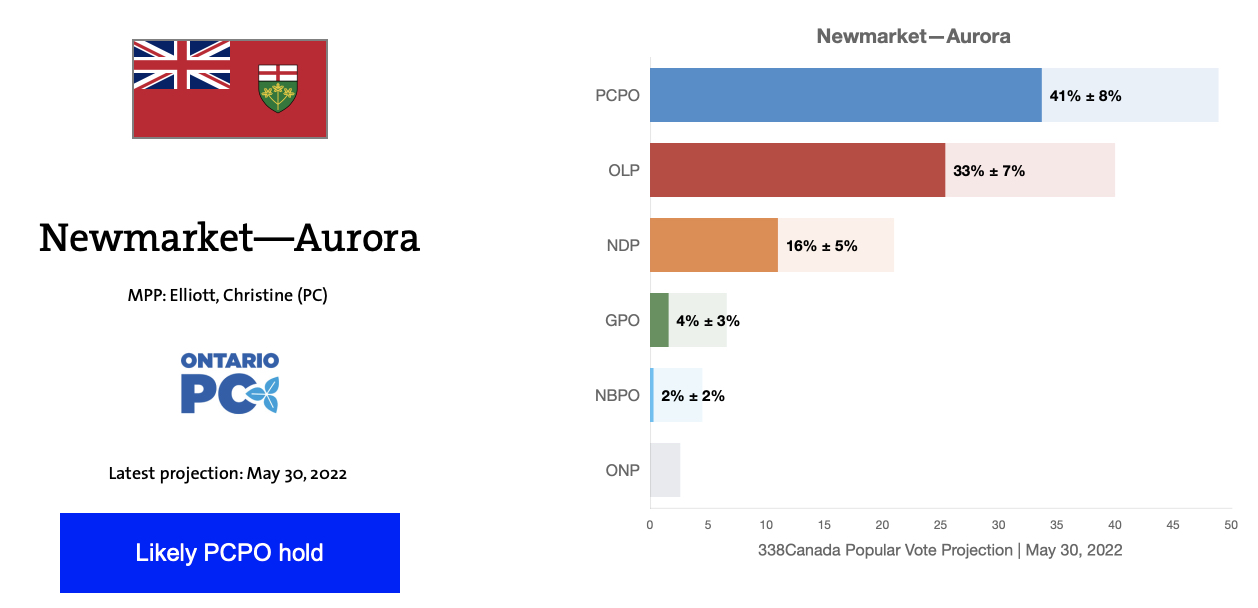
- Details
- Written by Gordon Prentice
Ontario is sleepwalking into a second Ford term. Unless something wholly unexpected happens before Thursday then Christine Elliott’s office manager will be our new MPP. I know next to nothing about Gallagher Murphy and her views. I don’t even know how old she is. 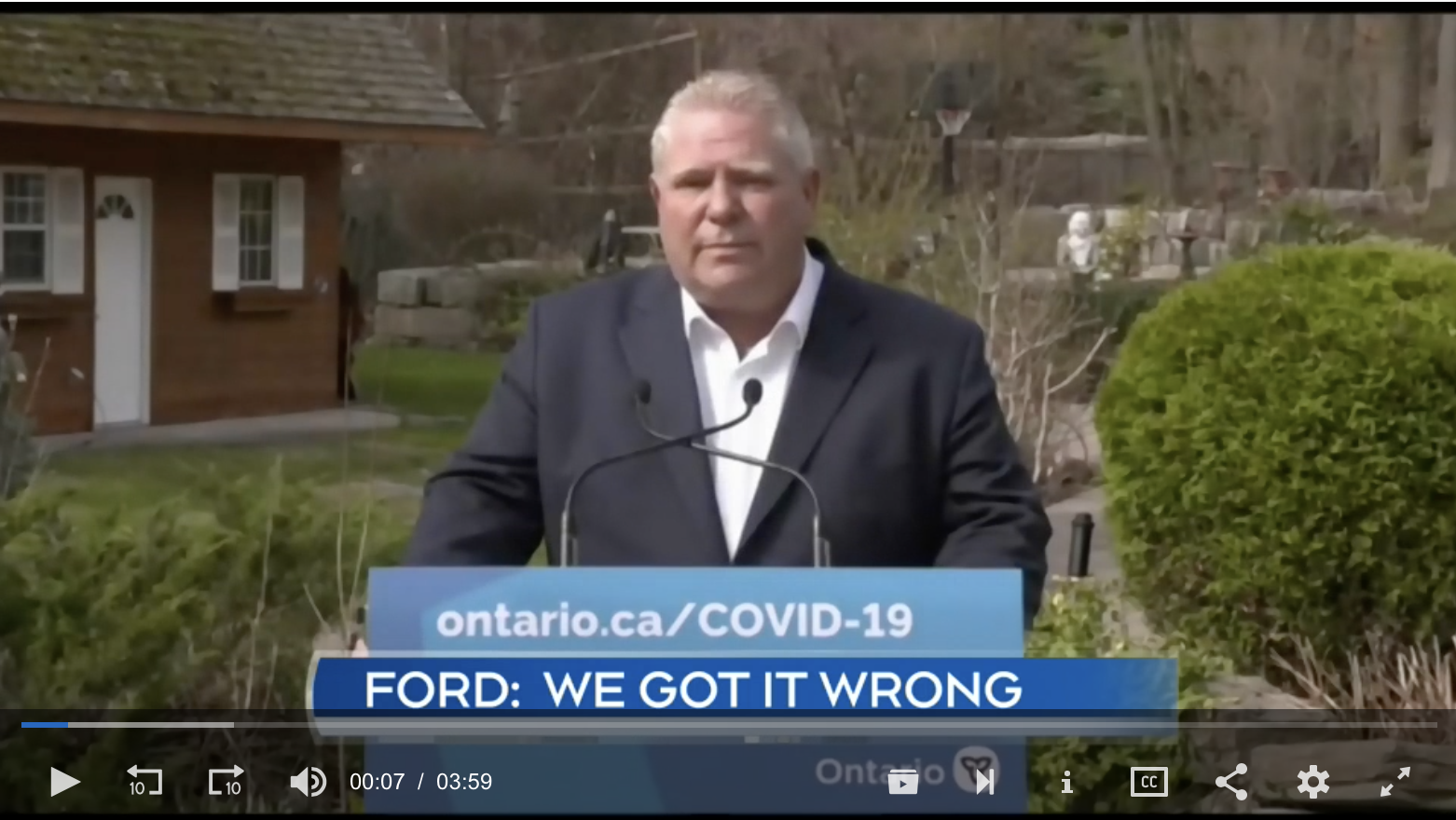
She has spent the last four years as Elliott’s office manager and 15 years running her credit card business. But before that her life is a complete mystery – at least to me. No letters to the press. No interviews. No articles. No Tweets until a few weeks ago. No opinions. A blank sheet of paper. A complete cipher.
I am left wondering why Conservatives should vote for her.
No-Show
She has been a no-show at every single one of the candidates’ debates and has not bothered to get back to Newmarket Today setting out her position on the key policy issues affecting our Town and the surrounding area. The New Blue candidate's response is here. The NDP's here. The Greens here. And the Liberals here.
Is this what today's conservatism stands for? Avoiding controversy? Hiding under bushes?
She refuses to engage with the other candidates. Her campaign is unbelievably shallow and trite.
Mute and insipid 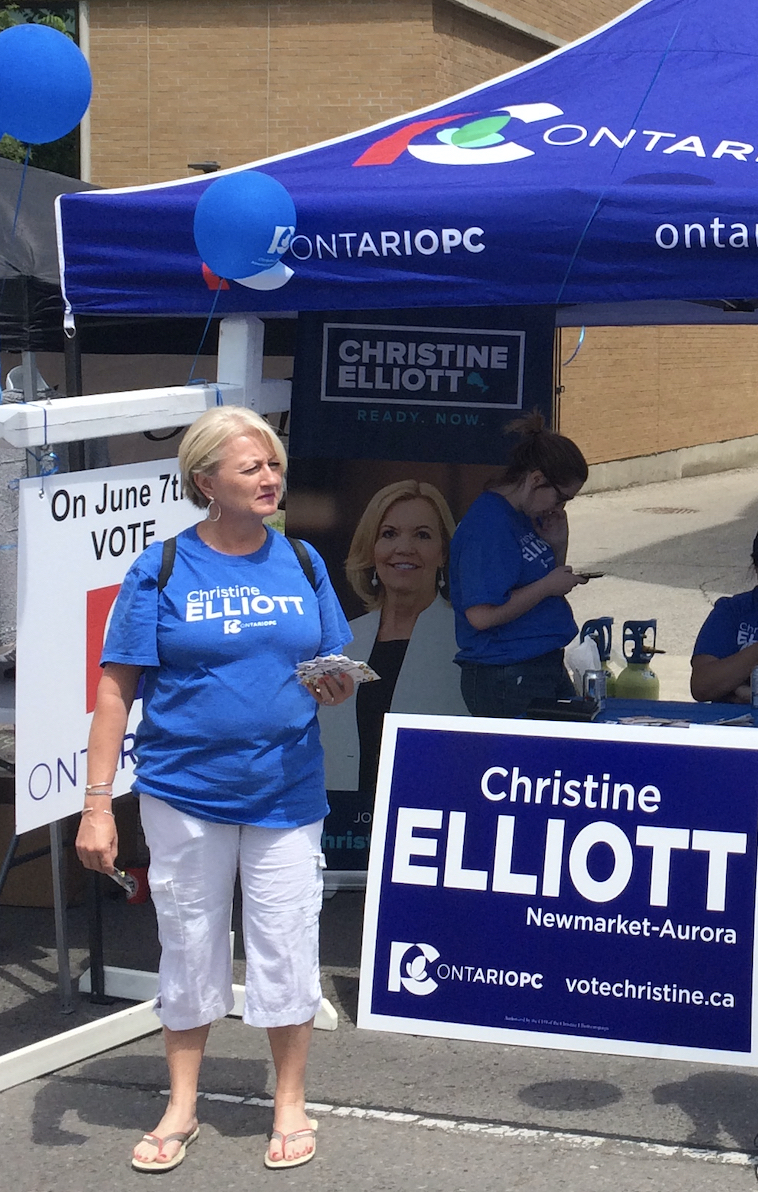
By any measure, the mute and insipid Gallagher Murphy is the complete antithesis of what we need in our candidates for elected office. We need people who can confidently express a point of view and have the wit and capacity to argue their case in front of all comers. They should not be afraid to stake out their own views on the big issues of the day.
Instead, we have this listless and utterly useless candidate inventing reasons for not showing up at debates and claiming (falsely and absurdly) to have knocked on 25,000 front doors during the campaign.
This was the same office manager who allowed one of her staff to tell me in June 2019 to come back in the Fall if I wanted to make an appointment to see my then MPP, Christine Elliott. (I wanted to know if Buck-a-beer was really going to allow Andrew's Convenience Store and others like it to sell beer. They still can't.)
What was the deal?
Gallagher Murphy was personally appointed by Ford as Official PC candidate for Newmarket-Aurora on very same day Christine Elliott announced she was standing down. Why? What does he see in her? And what was the deal with Elliott?
Of course, Ford has done this before. In 2018 he appointed a long list of PC candidates, autocratically ignoring the views of local Party members on the ground.
Will Bill Hogg, the President of the Newmarket-Aurora PC Riding Association, who resigned in protest at Gallagher Murphy’s appointment, be voting for her? I rather doubt it.
But, to return to the main point, which Doug Ford does Gallagher Murphy support?
Which Doug Ford? Three to choose from.
The right-wing firebrand, the affable centrist, or the leftist, cheering on the workers and defending their unions?
The convicted fraudster Conrad Black describes Doug Ford as the most left wing leader the PCs have ever known. He says Ford's leftward shift has created a vacuum for the New Blue party to fill.
Ford is certainly a very accomplished shape-shifter. First he was cutting the deficit, freezing the minimum wage and taking on public sector workers. Next came the tearful Ford admitting he sometimes got things wrong in the pandemic. And now, the latest reinvention, the man who is going to get it done regardless of the cost.
Black urges conservative leaning voters to support the New Blues though he recognises they have no hope of winning.
Constitutional conventions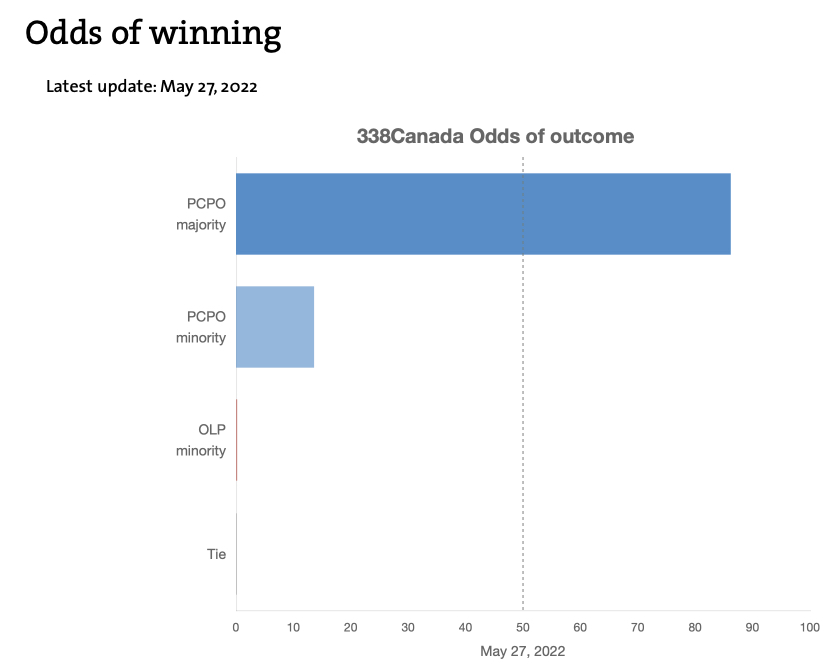
Ford’s conservatism is, though, not very conservative.
He ignores constitutional conventions and doesn’t think twice about dropping solemn undertakings given to the public.
Ford gave a cast iron guarantee that budgets would be presented by the end of March each year, enshrining the promise in legislation. This year the Budget (which also serves as the PC platform) was presented in April. It was never voted on. The Housing Bill passed in two weeks from start to finish - and received Royal Assent in the middle of the public consultation period.
Expect more of this when Ford wins on Thursday.
No platform
Unlike the Liberals, the NDP and the Greens, the Ontario PCs have no formal platform. They have five bullet points and the contents of the April Budget.
So what will tomorrow bring? Who knows?
Will Ford revisit his 2018 plan to reorganise municipalities to streamline service delivery and save money?
Will he let rip with Ministerial Zoning Orders, removing any voice for municipalities on what should happen in their own areas?
And when things get tight financially for the Province who will be expected to carry the burden?
I think I know the answer to that one.
This email address is being protected from spambots. You need JavaScript enabled to view it.
Below: Protests outside Christine Elliott's constituency office in June 2019
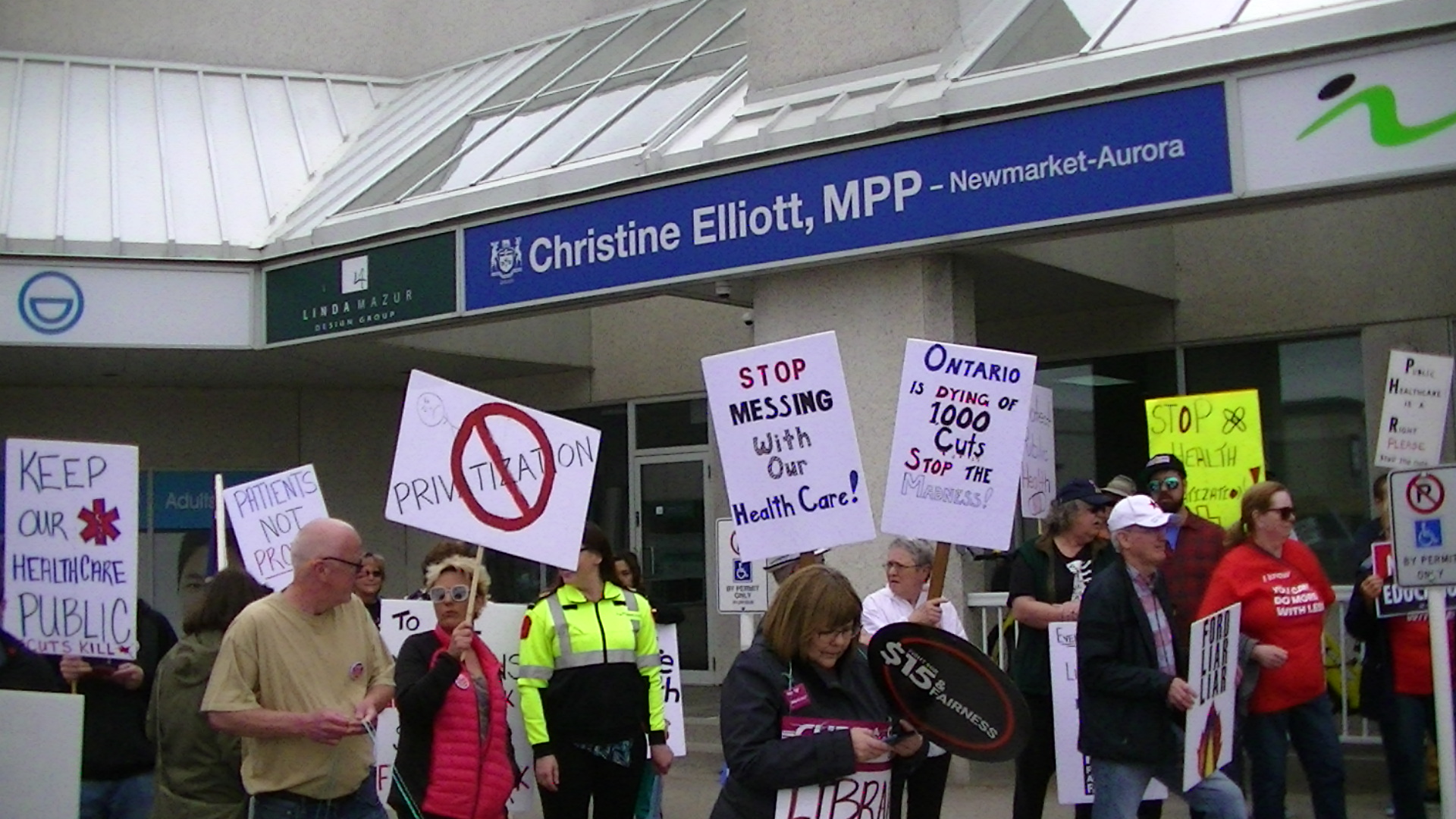
Page 73 of 287